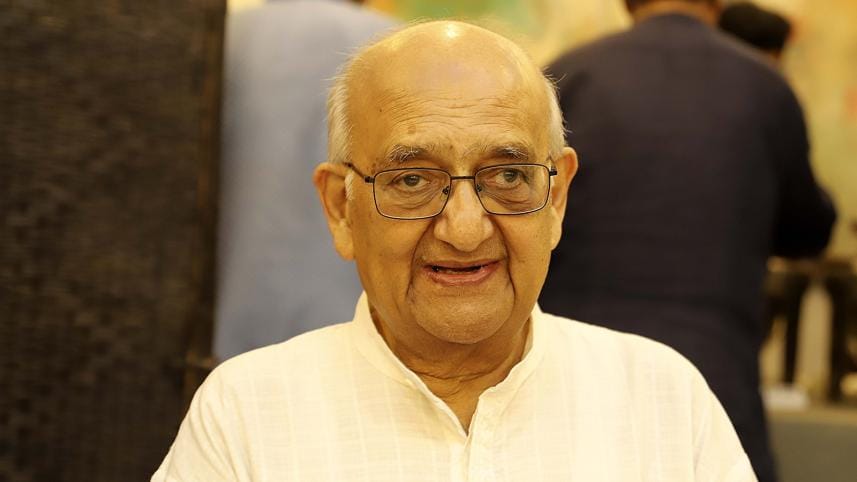Economy progresses, challenges emerge as well

Bangladesh has made significant strides in pulling off steady economic growth and bringing about human development in the last 25 years while institutional weaknesses have also created numerous risks, a noted economist said yesterday.
"Institutional weaknesses have appeared and they are now a central element of the economy," said Prof Rehman Sobhan, chairman of the Centre for Policy Dialogue (CPD).
He made the comments at the launch of a book, titled "Fifty Years of Bangladesh: Economy, Politics, Society and Culture", on the premises of the think-tank in the capital.
Prof Sobhan said the country has seen a lot of economic development in the last 25 years, with yearly remittance earnings now over $20 billion and foreign exchange reserves rising to $45 billion a few years ago.
It also has seen significant improvement in terms of reduction of poverty and human development.
"Once our ready-made garments sector was involved only in tailoring activities, providing little value-addition. Now, the backward linkage in RMG is huge," Prof Sobhan said.
He said most institutions are not functioning well. The Election Commission, the Anti-Corruption Commission, and the Bangladesh Bank all are doing the same, he said.
Banks are allowing some borrowers to get rescheduled benefits year after year while others are allowed to carry on and perpetuate default loans.
"The debt default crisis is the centre of the governance problems," Prof Sobhan said.
He said politically influential individuals are dominating the banking and garment sectors.
"On the one side, they are dominating the political system and on the other side, they are influencing the governance system.
Prof Sobhan recalled after President Ziaur Rahman's regime, he, along with another economist, found out that Bangladesh Shilpa Bank and Bangladesh Shilpa Rin Shangstha were in trouble due to bad loans, which accounted for 80-85 percent of their credits disbursed.
"Now, the bad debt crisis has become a much more serious structural problem for the banking sector."
Speaking about the future of the economy, he said there is a possibility of Bangladesh transforming into a dynamic developed country on the back of its population's entrepreneurial spirit.
"However, to do so, it will need to overcome the challenges it is facing now."
At the event, Selim Raihan, executive director of the South Asian Network of Economic Modelling, one of the authors of the book, said the economy grew despite institutional weaknesses and deteriorating regulatory standards.
The concern for the future is the existence of a corrupt and anti-reform alliance. To resolve that, a political consensus is necessary, he said.
The book, published by Routledge of London in November 2023, portrays the multi-faceted dimensions of Bangladesh's development journey, its economic and social transformation and political and cultural contestations.
The book was edited by Prof Rounaq Jahan, a distinguished fellow of the CPD, and Prof Sobhan.
"No miracle was behind the economic growth of Bangladesh, as shown in the book. It was the labour force that played the major role in achieving GDP growth," said Rizwanul Islam, a former special adviser for the employment sector at the International Labour Office in Geneva.
With the help of high-yielding rice seeds, the agricultural sector played a major role in the steady economic growth.
The revolution took place silently, he said, adding that industrial workers and remittances sent by migrant workers from abroad played another key role.
The population's aspirations for development contributed to the growth journey and boosted the country's economic resilience, said Hossain Zillur Rahman, executive chairman of the Power and Participation Research Center.
At present, the country is stuck in an economy of cheap labour. To overcome the challenges and move to the next phase of development, focus should be given to education and proper political agenda, he said.
Mustafizur Rahman, a distinguished fellow of the CPD, said the country had contended well with the first-generation challenges but questions remain about how it will face the second-generation challenges, which will come after Bangladesh graduates from the group of least-developed countries in 2026 and loses many trade benefits.
"In that period, the county will have to have a high-tech-based industry, high productivity, and efficient industrial systems."
"However, Bangladesh is still far behind in this regard. If the country cannot achieve it fast, the middle-income trap could be the new problem."
Zahid Hussain, a former lead economist of the World Bank's Dhaka office, Matiur Rahman, editor of the Prothom Alo, Syed Akhtar Mahmood, a former lead private sector specialist of the World Bank Group, MM Akash, a former chairman of the economics department of Dhaka University, and Ali Riaz, a distinguished professor of Illinois State University, also spoke at the event.



 For all latest news, follow The Daily Star's Google News channel.
For all latest news, follow The Daily Star's Google News channel.
Comments